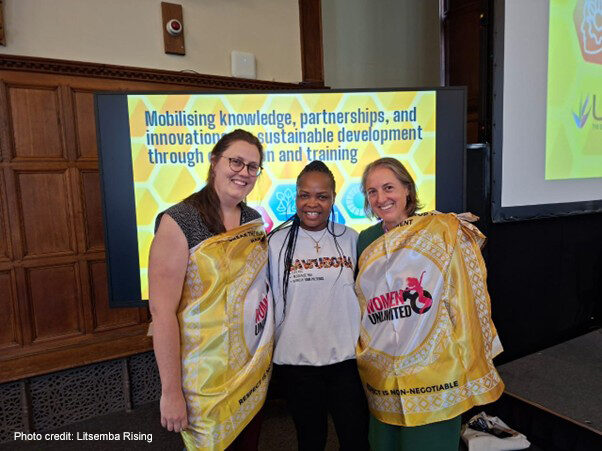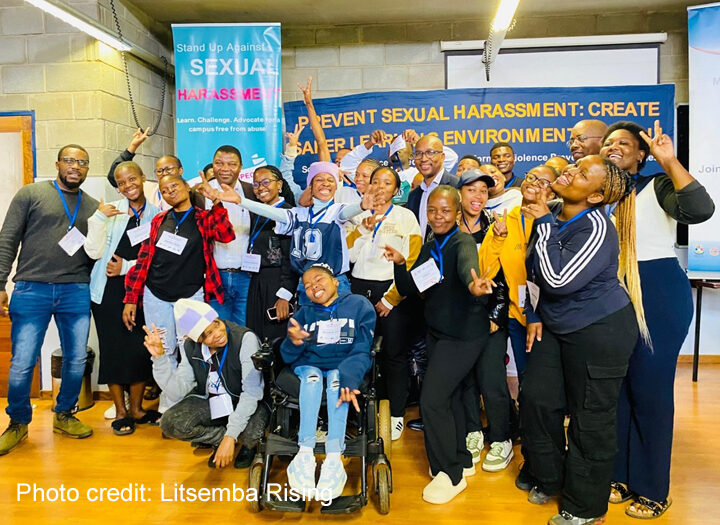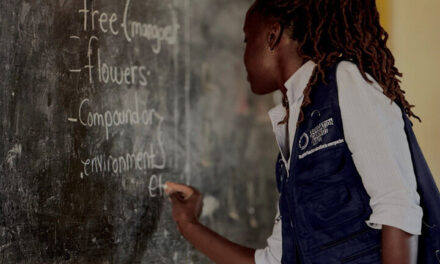By Vimbai Kapurura, Founder & Executive Director, Women Unlimited Eswatini. For the 2025 UKFIET conference, a record 37 individuals from 15 countries, including Vimbai, were provided with bursaries to assist them to participate and present at the conference. The researchers were asked to write a short piece about their research or experience of attending the conference.
In September 2025, we had the opportunity to take LITSEMBA RISING beyond Eswatini’s borders, joining colleagues and research experts at the UKFIET 2025 conference – through a symposium on “Leveraging evidence to address gender-based violence in higher and tertiary education: A collective priority.”
The symposium offered a space to exchange ideas with researchers, policymakers, and practitioners from across Africa, Latin America and the Middle East, sparking rich conversations about evidence-based interventions, institutional support, and cross-contextual strategies to enhance student safety and wellbeing.
When we launched LITSEMBA RISING, a peer-driven sexual harassment prevention programme at the University of Eswatini (UNESWA), we did so with the conviction that change must come from those at the heart of the problem – the students themselves.
Supported by the UK Aid Foreign Commonwealth & Development Office through the What Works To Prevent Violence programme, and implemented in partnership with Bantwana Initiative Eswatini and UNESWA, the intervention aims to transform universities from spaces of risk into environments of learning, dignity, and safety.
The urgent need
For many students in Eswatini, higher education is both a promise and a peril. Research shows that female students at UNESWA are four times more likely to experience sexual assault than their peers nationally.
Students are at risk of harmful norms such as sex-for-marks, sextortion, stalking and homophobic harassment, often at the hands of people they know (lecturers, supervisors or romantic partners). Silence persists, reinforced by stigma, fear and a culture that normalises harassment as part of “university life”.
Socio-economic vulnerabilities amplify these risks. With limited housing, most students live off-campus, navigating unsafe environments with minimal protection.
Peer leadership at the centre
LITSEMBA RISING is built on a simple yet powerful principle: harmful norms are learned and can therefore be unlearned. Change must be social, not just procedural. The programme trained Student Champions to engage other students through the Unlimited Interact Club (UIC) model, equipping them with 12 interactive modules delivered over six successive sessions.
These champions are now leading conversations on gender norms, consent, respect and accountability amongst others, reaching over 1,200 first and second-year students within the University.
Peer influence is central. Students are more receptive to messages from their peers. Student Champions create safe spaces for dialogue and action by modelling positive norms and promoting active bystander behaviours.
Institutional partnerships for sustainable impact
While student leadership drives the programme, sustainable change requires systemic support. LITSEMBA RISING works closely with UNESWA leadership to strengthen reporting mechanisms, integrate prevention into university systems, and reinforce policies that protect students. Collaboration with external stakeholders ensures alignment with national strategies to prevent gender-based violence.
Key insights
As the programme unfolds, several lessons are emerging:
- Context is critical: Approaches must be adapted to Eswatini’s unique realities rather than transplanted wholesale from other contexts.
- Universities are safety settings: Protecting students is as important as academic growth; policy enforcement matters.
- Peer-led change works: Students listen to each other but scaling these initiatives sustainably and affordably remains a challenge.
Looking ahead
LITSEMBA RISING is a reminder that students are not passive recipients of change; they are its catalysts. By combining peer-driven approaches with institutional support, we are beginning to envision universities in Eswatini where learning is truly liberating, and every student can pursue their education free from fear.




